On May 28, 2020, in collaboration with Professor KIM Rebecca ChungHee, APU Center of Inclusive Leadership (CIL) organized the virtual lecture themed “Inclusive Leadership amid COVID-19”, participated by over 200 students.
Professor Kim opened the lecture by welcoming presenters to the event: Professor AVVARI V. Mohan, Director of Research of Nottingham University Business School (NUBS) (Malaysia), Professor ALCANTARA Lailani L., Director of CIL; and Professor ACKARADEJRUANGSRI Pajaree, a research member of CIL.
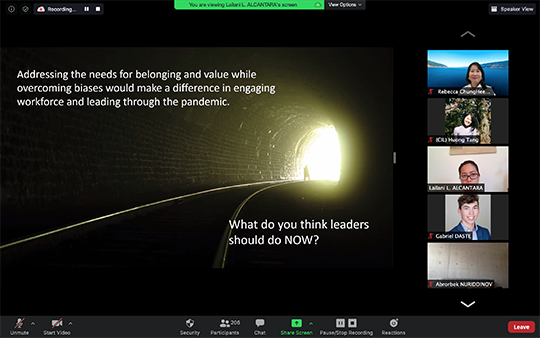
Noting the need for employee engagement (*1) and the challenges of maintaining engagement during a crisis, Professor Alcantara raised the importance of addressing fundamental human needs through inclusive leadership. She talked about tensions that leaders have to cope with in the face of a crisis, when they are expected to provide clear directions but also have to acknowledge “unclear paths”, and to demonstrate strength while at the same time, show vulnerability. Professor Alcantara later discussed how the pandemic is posing challenges to the two fundamental dimensions of inclusion, which are sense of belongingness and value for uniqueness. She drew on situational challenges that might disrupt social connections at a workplace and cognitive challenges that might limit and bias leaders’ response to their employees’ needs. Finally, she gave practical suggestions on what leaders can do, including giving people the benefit of the doubt, creating “small” victories and rethinking the “normal” ways of doing things, to keep fostering sense of belongingness and value for uniqueness to lead inclusively during this tough time.
(*1) Employee engagement is the employee’s involvement and satisfaction with as well as enthusiasm for work (Harter et al., 2002)
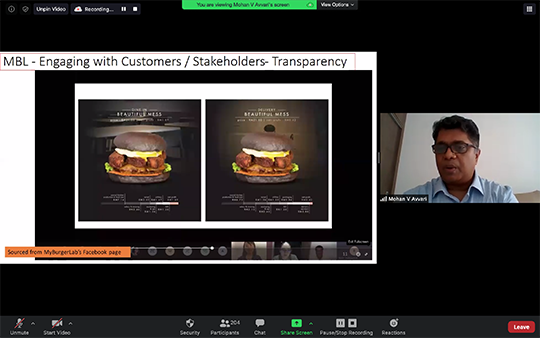
Acknowledging the need for engagement in times of a crisis, as highlighted by Professor Alcantara, Professor Avvari cited real-world examples of how young business leaders in Malaysia are thriving during the COVID-19 pandemic through stakeholder engagement. Drawing on the case of MBL (myBurgerLab), a Malaysian SME in the F&B industry, he emphasized that despite being a young company with limited resources, MBL managed to communicate and engage effectively with all of their stakeholders including the staff, customers, suppliers, community, government and business organizations. As highlighted in the course of stakeholder engagement, MBL utilizes different channels and tools such as creative content on social media, timely communication with customers, collaboration with competitors and transparent and responsible management. He closed the presentation with an inspiring message to the young audience, sharing his belief in young people’s capabilities and encouraging them to keep a positive mindset and actively contribute to the betterment of society.
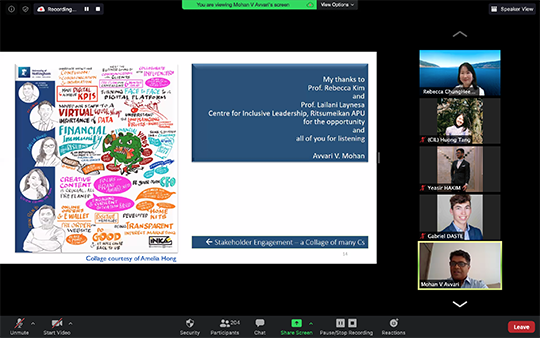
Associate Professor Ackaradejruangsri opened up her presentation titled “How Inclusive Leaders Act in the Times of Pandemic” by revisiting the concept of VUCA (*2) world, which reflects the current reality of the COVID-19 pandemic. Stating that the coronavirus has forced leaders to take the “leadership tests”, she argued that passing the test requires them to act in an urgent, honest, iterative way with the right mindset and inclusive approach. To illustrate this, she cited examples of how inclusive leaders from different parts of the world act in the times of crisis. New Zealand Prime Minister ADERN Jacinda’s early and proactive measures against COVID-19 showed how inclusive leaders can “be ahead before the real crisis hits”, having people’s safety as the priority. In addition, Airbnb Co-founder and CEO Brian Chesky’s timely, dedicated and transparent communication demonstrated leaders’ responsiveness to the crisis. Later on, Professor Ackaradejruangsri shared voices of young inclusive leaders in Thailand about their mindsets and actions to navigate through the pandemic, which is also a part of her ongoing research project on inclusive leadership. Inclusive leadership is not about the actual position or title, she concluded, rather it is about taking inclusive actions with the right mindset.
(*2) VUCA: Volatility, Uncertainty, Complexity and Ambiguity
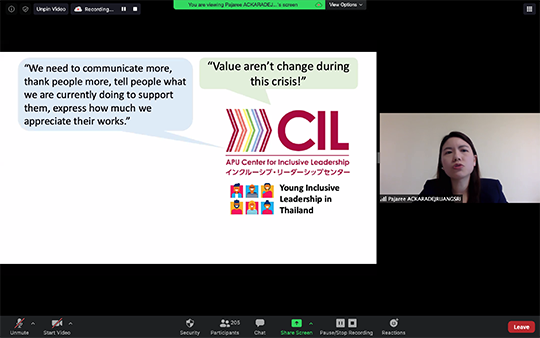
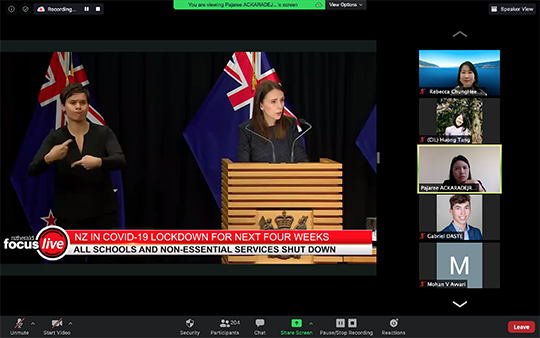
The three presentations were followed by a Q&A session, moderated by Professor KIM Rebecca ChungHee. As the audience had the option to post their comments and questions in real time in the course of the presentations, many shared critical thoughts and insightful questions. Each presenter took time to address the questions and helped deepen the understanding about inclusive leadership amid COVID-19 crisis.



